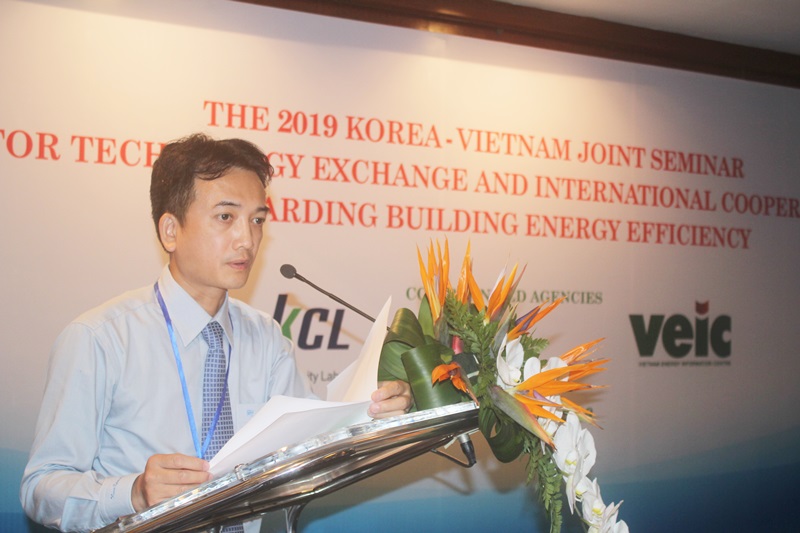 The overview of the seminar "Building Energy Efficiency".
The overview of the seminar "Building Energy Efficiency".
In the seminar, the experts from Vietnam and Korea presented the solutions on designs, applications of technology on energy efficiency and environmental protection for buildings, industrial zones, commercial centers, hotels… in Vietnam and Korea.
The statistic data of Vietnam show that the electricity consumption in the hotel, office, commercial center, industrial zone buildings ...reaches up to 35 - 40% of the total electricity consumption in the whole country. Meanwhile, the number of these buildings is being built more and more, leading to the increasing demand for energy.
However, in fact, there are about 90% of the buildings in Vietnam having not been integrated by energy efficiency with basic design and operation of the project. For concrete example: there are no interests in lighting, ventilation, cooling systems and using heat insulation materials with high energy-saving according to the international standards. This is a very huge waste, especially in case that when Vietnam has a high construction growth rate as 6-7% per year.
 Mr. Trinh Quoc Vu - Deputy Director of Department of Energy Saving and Sustainable Development (Ministry of Industry and Trade).
Mr. Trinh Quoc Vu - Deputy Director of Department of Energy Saving and Sustainable Development (Ministry of Industry and Trade).
Speaking at the seminar, Mr. Trinh Quoc Vu - Deputy Director of the Department of Energy Efficiency and Sustainable Development (Ministry of Industry and Trade) said: in recent years, the Government of Vietnam made efforts and strengthened the efficient energy use through implementing National Programs to promote energy efficient and saving use. The National Target Program on energy efficient and saving use in the first phase (from 2006 to 2010) was saved about 3.4% of total energy consumption, equivalent to about 4.5 million TOE, and in the second phase (from 2011 to 2015) was saved 5.65% of total energy consumption in the period, equivalent to about 11.261 million TOE.
On March 13, 2019, the Prime Minister signed Decision No. 280/QD-TTg to issue the National Program on energy efficient and saving use in 2019-2030 period. This program showed the objective in 2019- 2025 period as saving 5-7% of the total national energy consumption and 80 projects will be certificated as green buildings - energy efficient and saving use. In 2026-2030 period will be saved 8-10% of the total national energy consumption, equivalent to about 60 million TOE and 50% of construction materials with requirement for heat insulation will be energy labeled and 150 projects will be certificated as green buildings – energy efficient and saving use.
In the next part, the participants of the seminar focused on discussing policies and programs, exchanging and sharing experiences of Vietnam and Korea in energy efficient and saving use generally and in buildings, particularly through the following speeches:
1. Energy saving policies and programs in Vietnam.
2 .The results of Energy saving programs in Vietnam:
3. Proposing deployment of low-energy buildings in Vietnam.
4. Researching on design and energy conservation standards in domestic buildings (Korea) and Vietnam.
5. Introducing the effective classification system for domestic buildings - application plan in Vietnam.
6. Current status of heat insulation technology for buildings - applications in Vietnam.
7. Window technology to cope with climate change in Vietnam.
8. Paint technology to reduce cooling energy and urban heat island.
9. Status of technique for cutting thermal film and applications in Vietnam.
At the seminar there was also given the time for the general discussion on energy saving technologies in the construction sector with a goal to promote applying the advanced energy efficient technologies in accordance with the buildings in conditions of Vietnam.